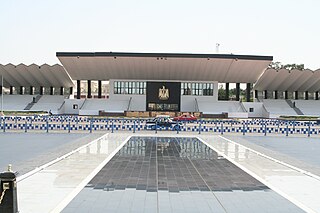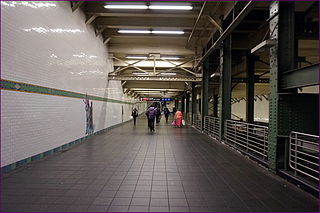
Jemaah Islamiyah is a Southeast Asian Islamist militant group based in Indonesia, which is dedicated to the establishment of an Islamic state in Southeast Asia. On 25 October 2002, immediately following the JI-perpetrated 2002 Bali bombings, JI was added to the UN Security Council Resolution 1267.

The Blitz was a German bombing campaign against the United Kingdom, in 1940 and 1941, during the Second World War. Hitler ordered reprisals for what was a token air raid on Berlin on 25 August 1940. The term was first used by the British press and originated from the term Blitzkrieg, the German word meaning 'lightning war'.
The Baedeker Blitz or Baedeker raids was a series of aerial attacks in April and May 1942 by the German Luftwaffe on English cities during the Second World War. The name derives from Baedeker, a series of German tourist guide books, including detailed maps, which were used to select targets for bombing.
In December 2000, an al-Qaeda-linked plot to bomb the Strasbourg Christmas market, at the feet of the Strasbourg Cathedral, on New Year's Eve was discovered. The plot was foiled by French and German police after a terrorist network based in Frankfurt, Germany, the "Frankfurt group", was unravelled. A total of fourteen people were convicted as part of the plot; four in Germany and ten in France, including the operational leader, Mohammed Bensakhria, thought to be a European deputy to Osama bin Laden. The alleged mastermind of the plot was thought to have been Abu Doha, who was detained in the United Kingdom.

A series of bombings occurred on 1 October 2005 in Bali, Indonesia. Bombs exploded at two sites in Jimbaran Beach resort and in Kuta 30 km (19 mi) away, both in south Bali. The terrorist attack claimed the lives of 20 people and injured more than 100 others. The three bombers also died in the attacks. The attack was known in Indonesia as the second Bali bombing or Bali bombing II to distinguish it from the previous attack in 2002.

The Liverpool Blitz was the heavy and sustained bombing of the English city of Liverpool and its surrounding area, during the Second World War by the German Luftwaffe.

The Manchester Blitz was the heavy bombing of the city of Manchester and its surrounding areas in North West England during the Second World War by the German Luftwaffe. It was one of three major raids on Manchester, an important inland port and industrial city; Trafford Park in neighbouring Stretford was a major centre of war production.
On the 2000 Christmas Eve, a series of explosions took place in Indonesia, which were part of a high-scale terrorist attack by Al Qaeda and Jemaah Islamiyah. The attack involved a series of coordinated bombings of churches in Jakarta and eight other cities which killed 18 people and injured many others.

Right-wing terrorism, hard right terrorism, extreme right terrorism or far-right terrorism is terrorism that is motivated by a variety of different right-wing and far-right ideologies. It can be motivated by Ultranationalism, neo-Nazism, anti-communism, neo-fascism, ecofascism, ethnonationalism, religious nationalism, anti-immigration, anti-semitism, anti-government sentiment, patriot movements, sovereign citizen beliefs, and occasionally, it can be motivated by opposition to abortion, tax resistance, and homophobia. Modern right-wing terrorism largely emerged in Western Europe in the 1970s, and after the Revolutions of 1989 and the dissolution of the Soviet Union in 1991, it emerged in Eastern Europe and Russia.
Fahd Mohammed Ahmed al-Quso, also known as Abu Huthaifah, Abu Huthaifah Al-Yemeni, Abu Al-Bara', Abu Hathayfah Al-Adani, Abu Huthaifah Al-Adani, Fahd Mohammed Ahmed Al-Awlaqi, Huthaifah Al-Yemeni, or Abu Huthaifah Al-Abu Al-Bara, was alleged to be a terrorist by American and Yemeni officials, and on the FBI Most Wanted Terrorists list. He was wanted by the FBI, Interpol, and the United States Department of State, which had offered 5 million dollars to anyone with information about him. He was killed by a US drone strike in Yemen on 6 May 2012.

Terrorism in Egypt in the 20th and 21st centuries has targeted the Egyptian government officials, Egyptian police and Egyptian army members, tourists, Sufi Mosques and the Christian minority. Many attacks have been linked to Islamic extremism, and terrorism increased in the 1990s when the Islamist movement al-Gama'a al-Islamiyya targeted high-level political leaders and killed hundreds – including civilians – in its pursuit of implementing traditional Sharia law in Egypt.

The Hull Blitz was the bombing campaign that targeted the English port city of Kingston upon Hull by the German Luftwaffe during the Second World War.
The attempted bombing of Northwest Airlines Flight 253 occurred on December 25, 2009, aboard an Airbus A330 as it prepared to land at Detroit Metropolitan Airport following a transatlantic flight from Amsterdam. Attributed to the terrorist organization al-Qaeda in the Arabian Peninsula (AQAP), the act was undertaken by 23-year-old Nigerian national Umar Farouk Abdulmutallab using chemical explosives sewn to his underwear. These circumstances, including the date, led to Abdulmutallab being commonly nicknamed either the "Underwear bomber" or "Christmas Day bomber" by American media outlets.
The 2011 Alexandria bombing was an attack on Coptic Christians in Alexandria, Egypt, on Saturday, 1 January 2011. 23 people died and another 97 were injured as a result of the attack, which occurred as Christian worshipers were leaving a New Year service. The attack was the deadliest act of violence against Egypt's Coptic Christians in a decade, since the Kosheh massacre in 2000 left 20 Copts dead. The target of the bombing was the Saints Church, a Coptic church located across the street from the Masjid Sharq El-Madina mosque.

On 9 June 2004, a nail bomb detonated in Cologne, Germany, in a business area popular with immigrants from Turkey. Twenty-two people were wounded, with four sustaining serious injuries. A barber shop was destroyed; many shops and numerous parked cars were seriously damaged by the explosion and by the nails added to the bomb for extra damage. Authorities initially excluded the possibility of a terrorist attack. The bomb, which contained more than 800 nails, was hidden in a travel compartment on a bicycle left in front of the barber shop.
London attack may refer to any of the following attacks that have occurred within London, London metropolitan area, City of London, Lundenwic, Londinium, or County of London:

There is a long history of terrorism in Europe. This has often been linked to nationalist and separatist movements, while other acts have been related to politics, religious extremism, or organized crime. Terrorism in the European sections of the intercontinental countries of Turkey and Russia are not included in this list.

Islamic terrorism in Europe has been carried out by the Islamic State (ISIL) or Al-Qaeda as well as Islamist lone wolves since the late 20th century. Europol, which releases the annual EU Terrorism Situation and Trend report (TE-SAT), used the term "Islamist terrorism" in the years 2006–2010, "religiously inspired terrorism" 2011–2014, and has used "jihadist terrorism" since 2015. Europol defines jihadism as "a violent ideology exploiting traditional Islamic concepts".

On December 11, 2017, a pipe bomb partially detonated in a corridor between the Times Square–42nd Street and 42nd Street–Port Authority Bus Terminal subway stations adjoining the Port Authority Bus Terminal in Midtown Manhattan, New York City, injuring four people including the bomber. Mayor Bill de Blasio described the incident as "an attempted terrorist attack". The bomber was identified by police as 27-year-old Akayed Ullah, a Salafi Muslim immigrant from Bangladesh; he was convicted in 2018 and sentenced to life in prison in 2021.
On 14 November 1992, 3.2 tonnes of explosives was discovered during a routine check on a lorry travelling on Stoke Newington Road, part of the A10, one of the main routes between London and the north. The Volvo lorry was stopped by police around 1 am; the occupants fled. Constable Raymond Hall - a former Royal Engineer soldier and Falklands War veteran - chased the suspects to a residential street, Belgrade Road no.7 where he was shot twice by one of them. Shortly afterwards police arrested one man, Irish lorry driver Patrick Kelly, a member of the Provisional IRA, who was alleged to have been driving the lorry.











